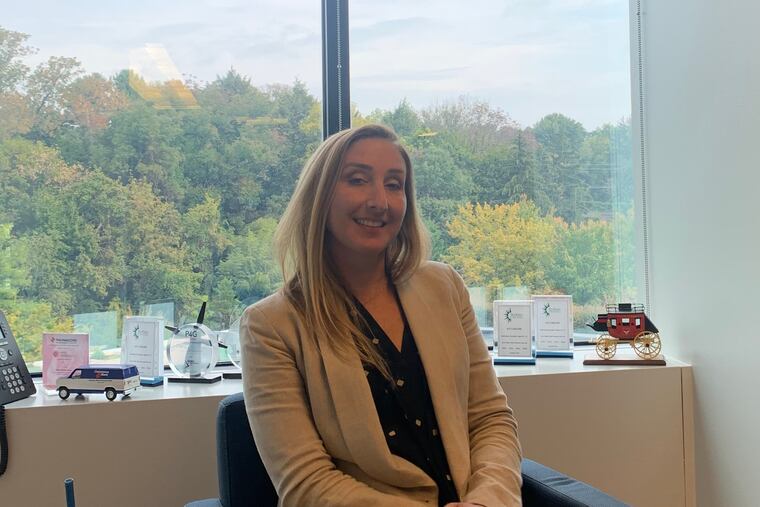As COVID-19 loosens its grip, the dealmakers are back — in person
“People crave in-person interaction,” says Ann Vazquez. She is helping put together a major conference for dealmakers on Oct. 26 in Philadelphia.

As the nation rebounds unevenly from last year’s pandemic shutdowns, the people who buy and sell companies for a living are back to it at a furious pace.
Buyout funds and other private-company investors have been setting records cashing out old assets and raising cash, in a trend fueled by surging stock-market values earlier this year that also raised values for non-public firms in hot industries.
Also booming, as the pandemic fitfully ebbs, is the personal contact vital to closing deals.
“There’s a lot of capital right now,” as well as “a lot of people who want to meet one on one” after a year of canceled investment-industry events and long-distance Zoom calls, said Anne Vazquez, a general partner at $2.5 billion asset NewSpring Capital in Radnor.
Vazquez is in a position to do something about that. Besides her day job arranging funding for mid-size mergers and acquisitions, the Main Line native is also the new president of the Philadelphia area’s chapter of the Association for Corporate Growth, an organization for deal makers with 600 area members.
Once COVID-19 hit, the group had to cancel its days-long M&A East conference and instead held a string of virtual events. This year, M&A East is back as a “vaccination-only event” where would-be investors and companies seeking financing will mix it up for a day, Oct. 26, at the Philadelphia Convention Center.
The event sold out a month ago, said Stephanie McAlaine, the chapter’s executive director since 1999 (she recently accepted a job with ACG’s national organization.) “Investment bankers are super busy this year,” and they’re hungrily looking for leads.
At one time, deals were mainly struck regionally. The idea was “as far as I can drive in a day, I can invest,” McAlaine said.
But M&A investing, even for small and midsized companies, “has evolved,” Vazquez said. “It is now a national business.”
Why? Improved disclosure and the acceptance of virtual meetings has put nearby and faraway investors on a more equal footing.
So has increased specialization, said Vazquez. For example, health-care investors now focus not just on medical devices or genetic engineering, but on smaller groups of businesses within those fields — niches, say, that depend on insurance reimbursement, research grants, or esoteric technology. Specialists in such arcana are often rare, dispersed, and more likely to seek bargains far from home.
If investors are coming here from farther away, that’s good for local companies, including ACG members, seeking capital or other financing from any source.
How does it all affect the larger Philadelphia community?
Investments can yield complex local results. Consider, for example, the transformation of S. Walter Packaging, which for 50 years designed high-end department-store purchase and gift boxes from 2900 Grant Ave. in Northeast Philadelphia.
Six years ago, the company’s future was on the line at an earlier M&A East conference. At that time, its private-equity owner was looking to get out. Vazquez’s firm and Larson McCall, another Main Line private-investments firm, decided to get in.
And, as it happened, Kurt C. Koloseike was looking for his next job after the sale of his previous business, Gilbertville-based FlagZone, a maker of high-quality flags.
S. Walter was in decline, feeling the pain as its longtime mall-store customers lost shoppers to online services. The new investors saw a new path: upgrading its gift boxes and selling them directly to expensive brands like Tiffany jewelry or Stolichnaya vodka.
Instead of buying from wholesalers in China, that meant building more boxes in the U.S., where managers could better control quality. But they needed a seasoned executive to make it work.
Steve Hobman, a partner at NewSpring, knew Koloseike from his previous job, and recommended him as S. Walter’s new leader.
In 2017, Koloseike used investors’ money to buy a factory, moving production to the U.S. and tripling S. Walter’s employment to 300. In 2019 the company built a new headquarters. NewSpring has since cashed out at a profit. Larson McCall is still an investor. Koloseike is still in charge.
“The fastest-growing part of the business is now our domestic design and manufacturing,” he said.
It sounds like a win for Philadelphia investors in a Philadelphia company — except that S. Walter Packaging isn’t in the city anymore. The plant it purchased is in Wisconsin and its new headquarters is in Berks County’s warehouse belt.
“Doing business in Philadelphia is not easy,” Koloseike said.
He said the firm struggled to find workers and expansion space in Philadelphia, among other issues.
In the end, capital from private investors may have saved S. Walter from shutting down — and certainly made the company larger and more valuable — but it also meant leaving home.